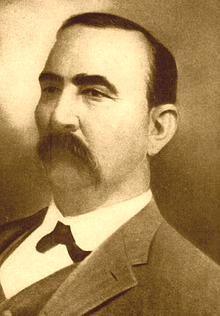William Charles Rogers

William Charles Rogers was born near Claremore, Oklahoma, USA, on 13 December 1847. A successful farmer, he entered local politics in 1881.[1]
A member of the Downing Party, he was elected Principal Chief in 1903, defeating E. L. Cookson of the National Party. He served during the final days of the takeover of the Cherokee government by the United States of America and the establishment of the state of Oklahoma.
| “ | But a crisis in our affairs is at hand. The Government which our forefathers cherished and loved and labored so hard to perfect, has been sentenced to die. The scepter must soon pass to other hands. Still, we must force back the resentment we feel and accept the conditions as they are. The decrees of fate are inexorable. Representative bodies are usually brought together to organize or maintain a government; seldom indeed is the spectacle afforded of such a body of men calmly assembled together to prepare for its own dissolution and yet your coming together is largely for that purpose. The importance of this melancholy fact must not be underestimated or approached in a spirit of indifference. The best service of which you are capable is the demand of the hour and painstaking effort should characterize your every act so that the result may redound to the everlasting credit and benefit of our people. (William C. Rogers, November 9, 1904, speech to Cherokee Council.)[1] | ” |
After his four-year term of office was complete, he retained the status of chief, for purposes of dealing with matters of the handover of power to the United States. He died on November 8, 1917 in Skiatook, Oklahoma.
Rogers was a Freemason and was buried near Skiatook, Oklahoma, a town which he had established.[1]
| Preceded by Thomas Buffington |
Principal Chief of the Cherokee Nation 1903–1907 (extended to his death in 1917) |
Succeeded by J. B. Milam |
References
- ↑ 1.0 1.1 1.2 Chronicles of Oklahoma at digital.library.okstate.edu
Chronicles of Oklahoma, Volume 17, No. 2; June, 1939; by John Bartlett Meserve.